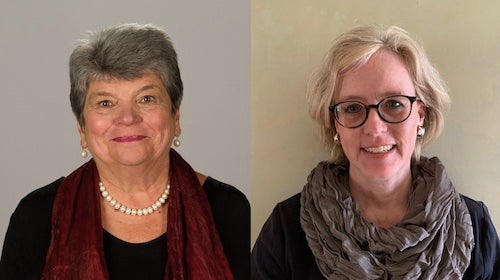Georgetown Nurse Ethicists Help Develop Ethics Toolkit for New ‘Essentials’ of American Association of Colleges of Nursing
December 7, 2021 – Earlier this year, the American Association of Colleges of Nursing released The Essentials: Core Competencies for Professional Nursing Education – a major, multi-focused guide for how schools educate their beginning and graduate-level nursing students.

Left to right: Dr. Carol Taylor and Dr. Sarah Vittone helped produce an ethics toolkit to support the implementation of the new Essentials of the American Association of Colleges of Nursing.
“This competency-based approach to preparing nurses involves a system of education based on students demonstrating that they have learned the knowledge, attitudes, motivations, self-perceptions, and skills expected of them as they progress through their program of study,” according to the association.
Ten “domains” form the publication’s focus – ranging from population health and interprofessional education, to professionalism and quality and safety – which are built upon a foundation of eight essential topic areas, including the social determinants of health; diversity, equity, inclusion; and ethics.
Georgetown Ethicists’ Contribution
With respect to ethics, Georgetown colleagues Dr. Carol Taylor, professor of advanced nursing practice, and Dr. Sarah Vittone, assistant professor of professional nursing practice, helped develop a new 10-page ethics-related toolkit to support the Essential’s 10 domains.
“All nursing actions have ethical implications to the extent that they are aimed at intentionally fulfilling nursing goals which are ethical goals of providing a good and meeting unmet health needs,” the toolkit reads. “Developing nurse moral agency should be an ongoing aim of initial and continuing nurse education.”
The document presents detailed guidance in terms of how to incorporate and assess complex ethical issues within bachelor’s, master’s, and doctor of nursing practice programs. For faculty and program administrators, it also offers resources and references.
‘A Real Demand’
Taylor said that she and Vittone “were delighted” to participate in this process, particularly “given Georgetown’s excellence in ethics.” They produced the toolkit with Dr. Pamela Grace, associate professor emerita from Boston College, while collaborating with more than 70 nurse educators, practitioners, and researchers.
“Since nursing at Georgetown has a long history of requiring ethics competencies of and courses for our undergraduate and graduate students, we had a wealth of learning strategies, content, and assessment measures to help schools transition their programs to meet the new ethics competency expectations,” Taylor added.
(Indeed, according to Dr. Alma Woolley’s history of Georgetown’s School of Nursing, the “ethics of nursing” was taught at the school’s beginning in the early 20th century.)
The renowned ethicist described how critically important an ethical lens is within the complexities and challenges of the modern health care field. “With all the pressures in health care today, there is a real demand for ethics leadership, and we are confident that our graduates can address this demand,” Taylor said.
By Bill Cessato
